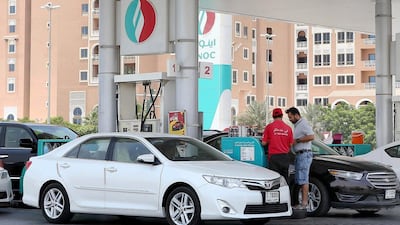Business chiefs yesterday backed a landmark move to scrap transport fuel subsidies even as consumers braced for paying more at the pumps.
The decision to set prices for diesel and petrol based on world prices is expected to save billions of dollars a year.
“It is a good move,” said John Lodewijks, a professor of economics at SP Jain School of Global Management in Dubai.
“It encourages people to conserve the use of gasoline, to reduce unnecessary driving, and it protects the environment and encourages people to look to new forms of transport.”
Fuel prices will be deregulated from next month and replaced by an as yet undisclosed pricing policy, the government said.
Supporting energy prices is costing the UAE as much as US$29 billion a year despite substantial progress in their reduction over the past two years, the IMF said this week.
With global energy prices at historically low levels the real impact of yesterday’s surprise move may only start to be felt when the price of oil moves higher again.
“It’s better to do this now, rather than when oil was at $100 per barrel. It’s a way of implementing reform without too much pain,” said Jason Tuvey, an emerging markets economist at Capital Economics based in London.
“It’s a big move for a Gulf country to deregulate petrol prices. It’s an encouraging step as the government tries to place the public finances on a sounder footing.”
Click here for in-depth reaction to the fuel price announcement
If energy subsidies were to be removed completely, the impact on the country’s fiscal position would be dramatic, analysis from Capital Economics shows.
The UAE’s break-even price would fall to about $65 per barrel, down from its current price of around $80 per barrel.
The country’s projected fiscal deficit for this year, estimated at 5 per cent of GDP, would fall to just 1 per cent of GDP.
The deregulation of fuel prices is expected to have a significant effect on several industries both directly and indirectly as well as on the cost of living.
“It’s hard to gauge the impact on inflation at this point as details of the reform mechanism have yet to be announced,” said Monica Malik, chief economist at Abu Dhabi Commercial Bank.
“The UAE has been the most proactive since the fall of oil prices, especially with subsidy reform. That is promising for fiscal sustainability. We’re seeing signs of strong commitment to fiscal reform.”
Car dealerships are already anticipating shifting business strategies to accommodate a likely increase in the price of petrol.
Arno Husselmann, general manager of Abu Dhabi Motors which imports BMW, Rolls-Royce and Mini automobiles, said that the government’s decision to remove the subsidies was a necessity.
He expects demand to grow for smaller, more fuel-efficient engines to challenge the dominant four-wheel drive vehicles.
The UAE’s thriving logistics industry which relies on cheap diesel to transport goods around the region, is one sector that could be impacted significantly by any changes to fuel pricing.
Elias Monem, the chief executive of Agility Middle East and Africa, backed the move to build a “strong economy no longer reliant on subsidies”.
Fuel subsidies are widespread throughout the Middle East. They are used to keep prices low for consumers while the government picks up the remaining actual cost.
But the falling price of oil has hit the region’s energy-exporting economies hard , encouraging policymakers to study their removal.
Oil fell in New York yesterday, trading below $50 per barrel on signs the global glut was increasing.
“While the rationale for introducing fossil fuel subsidies is varied, they often have unintended consequences and tend not to be economically, socially or environmentally sustainable in the long run,” said Gus Schellekens, Middle East sustainability leader for PwC.
Still, the removal of such major price supports needs to be handled carefully to avoid short-term shocks, say economists.
“Firms need times to adjust to take higher prices in,” said Prof Lodewijks. “People will need time to adjust, and presumably that’s what the government is going to do. Petrol prices feed into the cost of living, inflation rates, and the real standard of living.
“We have some awfully affluent people around here, and the subsidies won’t make a difference to them. People on low incomes might feel this pretty hard.”
business@thenational.ae
Follow The National's Business section on Twitter

